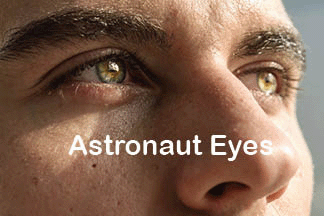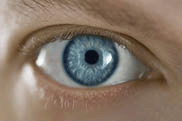Return to 2nd Quarter 2025 articles.

We read many quotes from various sources about humans traveling to the Moon, Mars, or some distant moon of Jupiter or Saturn. Most media stories seem to imply that a space suit is all an astronaut would need to survive the journey. They overlook the fact that the human body is carefully engineered to survive on Earth, not in space. Studies from the International Space Station show a new challenge for astronauts' eyes in space.
We can address the damage weightlessness causes to the heart and some other organs by providing enough cardiovascular activity on treadmills. However, new data on astronaut eyes show that long periods of weightlessness affect ocular biomechanics. More than 70% of astronauts on the International Space Station have Spaceflight-Associated Neuro-Ocular Syndrome (SANS).

NASA collected data on 13 astronauts who spent between 157 and 186 days in a weightless environment. The studies detailed a 33% decrease in ocular rigidity, an 11% decrease in intraocular pressure, and a 25% reduction in ocular pulse amplitude. These changes caused decreased eye size, an altered focal field, optic nerve edema, and retinal folds. The researchers point out that some of these effects can produce long-lasting changes in the eye’s mechanical properties.

Science shows that the human body is engineered and designed for the gravitational effects of our planet. Every organ has to adjust when the body is subjected to weightlessness, but most organs cannot change. When NASA put Scott Kelly in space and his identical twin Mark stayed on Earth, it provided a comparison. Scott was in space for 340 days during 2015-16, and there were numerous changes in his DNA and body.

Additional data shows the effect of extended weightlessness on the eyes. Some things, such as ocular pressure, have potential complications like glaucoma. Our bodies are engineered with many individual characteristics essential for life. The more variables that must be “just right,” the less likely it is that the final product could exist by chance.
For an airplane to fly, thousands of features must be carefully engineered. That requires engineers, not chance. That is even more true for the human body. God carefully designed us to live on planet Earth, and the media often oversimplifies what we need for space travel. Look in the mirror and behold the handiwork of God (see Psalm 139:14).
Picture credits:
© Javier Sanchez Mingorance/Bigstock.com
© Lisa_A/Bigstock.com
© mr. Smith/Bigstock.com
© keeweeboy/Bigstock.com
Scripture links/references are from BibleGateway.com. Unhighlighted scriptures can be looked up at their website.
